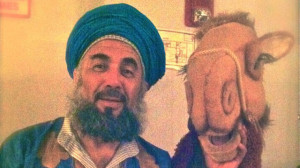In the past two decades, a Who’s Who of jazz and world music artists have knocked on Yassir Chadly’s door. Pharoah Sanders. Steve Coleman. Randy Weston. Omar Sosa. Stephen Kent. They all wanted to play with Chadly, a native Moroccan who lives in the East Bay and has established a reputation as a consummate instrumentalist. Chadly makes the oud and the gimbri, stringed instruments whose origins go back millennia, echo with soul and vibration.
When he’s not accompanying other musicians, or performing for dance outfits like Alonzo King Lines Ballet, Chadly is surprisingly funny onstage, prone to joking about himself or things he sees in the culture. At age 59, Chadly has spent more time in the United States than in Morocco, where he first learned the music that has defined his musical career in his adopted country.
In the Morocco of Chadly’s youth, spiritual music was so engrained in the culture that instrumentalists would go from house to house to perform and solicit alms. Gnawa music, a marriage of Moroccan and West African traditions that is designed for healing and trance, was especially formative for Chadly, who grew up in Casablanca.
“I used to look at how they played and sang, and I was happy to hear that music and learn it,” he says. “I bought my first gimbri from a guy who went from house to house. He was a wandering gimbri player.”
Besides being a professional musician, Chadly is an imam, or spiritual leader, of Masjid-Al Iman, a Sufi-oriented mosque in Oakland that welcomes non-Muslims to its services. Some adherents of orthodox Islam consider all music heretical. Chadly studied under the Naqshbandi, a Sufi order that traces its origins to the Muslim prophet Muhammad, and Chadly’s life changed several decades ago when Naqshbandi leaders told him that music of the spirit is allowed, though not music that Chadly says has its origins “below the bellybutton.”



